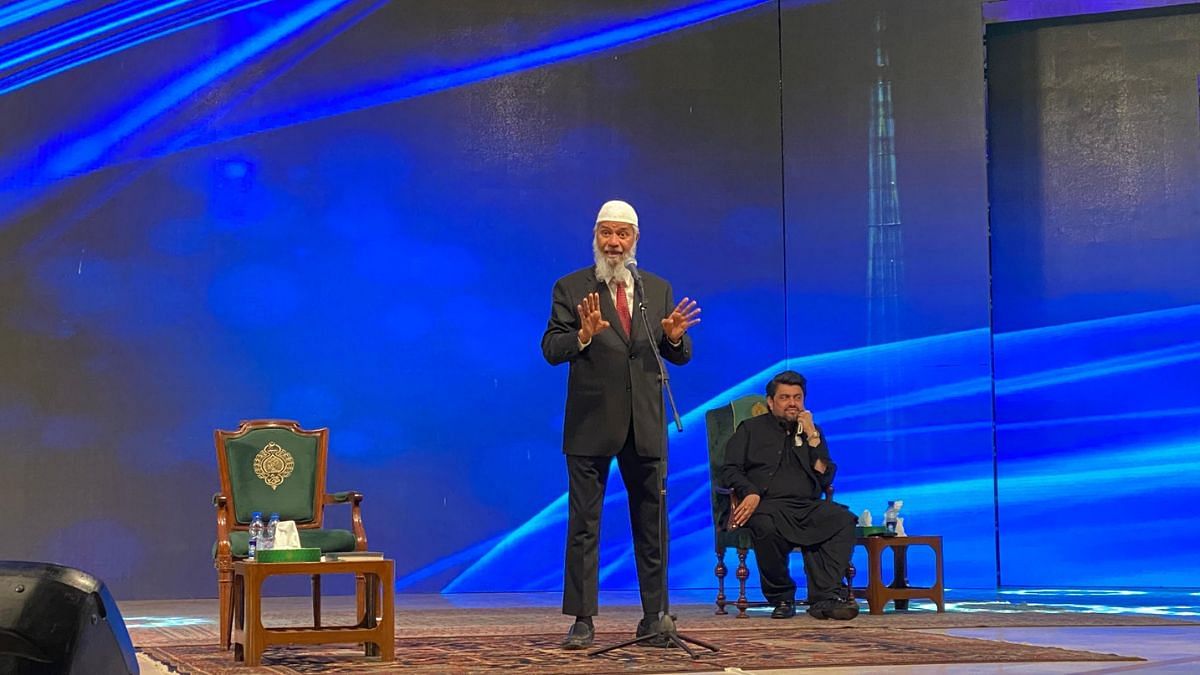Infamous Islamic preacher Zakir Naik is in the news for visiting Pakistan, adding to the state’s laundry list of controversial state guests. Naik is a fugitive in India, wanted on charges of hate speech, inciting communal hatred and more. But what’s particularly interesting is that even a conservative society like Pakistan, which has famously welcomed terrorists such as Dawood Ibrahim and Osama Bin Laden, finds itself baffled by Naik’s antics.
The preacher caused a stir when he abruptly left the stage during a recent event in Islamabad, organised by Pakistan Sweet Home and meant to felicitate orphan girls. When it was time for Naik to present honorary shields to them, he exited the venue on the grounds that he was na-mahram (not related by blood) to them. Naik’s refusal to continue the ceremony, and his objection to the organisers calling these little girls ‘daughters’, sparked outrage in Pakistan. Rightfully so, considering it overshadowed the event’s intended purpose of recognising and celebrating orphan children.
Naik’s argument seems inconsistent and illogical. Is he suggesting that he avoids interacting with all non-mahram women? If so, how does he manage to travel internationally? During his travels, he inevitably encounters numerous non-mahram women—from flight attendants to ticketing agents and many more. Yet, there has been no indication that he refrains from flying or interacting with them in such settings. This selective application of Islamic principles raises questions about the credibility and consistency of Naik’s stance.
One can only imagine the impact such an incident would have on impressionable minds. An event intended to support and inspire vulnerable children left them feeling disregarded instead. It seems that, at that moment, the preacher forgot the very teachings of kindness and care toward orphans that Islam so strongly advocates.
Also read: Indian Muslim leaders must drop Hezbollah solidarity. Put country before Muslimness
Offence is the best defence
Zakir Naik has reached star preacher status, his suited and booted persona standing in stark contrast to the typical conservative maulvi image. He spreads the word of Islam on stage and speaks in English—which is new for Muslims in the subcontinent. Notably, while he holds an MBBS degree, there is no record of a formal Islamic scholarly education beyond his being inspired and trained by Ahmed Deedat, a self-taught Muslim thinker, author, and orator on comparative religion.
Offence is the best defence, and Zakir Naik seems to live by this principle. It was evident in a video where a Pashtun woman from Pakistan asked him about the persistent paedophilia, drug abuse and adultery in her (deeply religious) region, and why no Muslim cleric ever addresses these issues. The preacher responded dismissively, proceeding to deny her claims entirely and demanding an apology.
Naik then shared the video on his X handle. Especially inconsiderate given how Pakistan has persecuted Pashtuns for decades, and how oppressed Pashtun women are known to be. His response to the question has drawn considerable criticism in Pakistan. Popular actress Iffat Omar openly criticised the Pakistani government for hosting Zakir Naik as a “state guest,” quoting the video in her remarks.
Also read: Zakir Naik is missing India—’Hindus love me, Pakistan International Airlines doesn’t’
Asking questions isn’t a sin
Islamic scholars are expected to engage in question-and-answer sessions and debates, but Naik’s behaviour—shutting down the woman and placing her in a difficult position—is typical of the way some maulvis react when faced with challenging questions. When they lack answers, they often resort to blaming the questioner, accusing them of committing a sin or going against Islam. The response of Mustafa Akyol, a senior Fellow on Islam and modernity, to Naik’s tweet, highlights this continuing problem: “If Islamic scholars crudely shut down important questions raised by sincerely troubled Muslims, as seen below, nothing will get better for the state of Islam or Muslim societies.”
However, Zakir Naik isn’t the only one promoting regressive and patriarchal interpretations of Islam. The subcontinent has plenty of maulvis with similar views. The real issue lies in the tendency of many maulvis and scholars to present themselves as the religion’s sole authority.
They often assert that their interpretations and beliefs are the definitive truth, dismissing any other perspectives. The Muslim community needs a deep churning—every person should have the freedom to ask tough questions, debate, and discuss without any fear. While Zakir Naik and the likes of him are more popular in the mainstream due to the influence of traditional scholars and patriarchal norms, feminist interpretations of Islam have also started to carve their space in the Muslim world. All thanks to the efforts of scholars, activists, thinkers and authors such as Amina Wadud, Haifaa Jawad and Siti Musdah Mulia, who are actively working to highlight the religion’s egalitarian principles.
Amana Begam Ansari is a columnist. She runs a weekly YouTube show called ‘India This Week by Amana and Khalid’. She tweets @Amana_Ansari. Views are personal.
(Edited by Zoya Bhatti)


